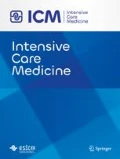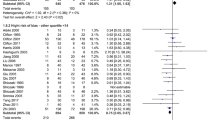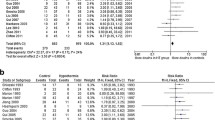Abstract
Objective
Brain injury remains the leading cause of death in cases of trauma in North America and Europe. This article critically appraised and summarised all published and peer-reviewed, randomised, controlled trials of the use of hypothermia in traumatic brain injury.
Design
To be included, a study had to be a published, randomised, controlled trial of the use of hypothermia in the management of traumatic brain injury. Pooling of data and meta-analysis of results occurred.
Setting
Conducted at a tertiary level Canadian teaching hospital.
Patients and participants
Patients were combined from eight randomised, controlled trials to generate a population of 748 severely head-injured patients.
Measurements and results
Eight studies provided data on the efficacy of hypothermia in the management of traumatic brain injury. The pooled odds ratio of mortality in the hypothermic group was 0.81 (95%CI =0.59–1.13, p=0.22). The OR of a poor neurological outcome (GOS 1,2 or 3) was 0.75 (95% CI=0.56–1.01, p=0.06). The odds ratio for pneumonia in the normothermic group was 0.42 (95%CI =0.25–0.70, p=0.001).
Conclusions
Although meta-analysis suggests that iatrogenic hypothermia may confer a marginal benefit in neurological outcome, there does not appear to be clear evidence of lower mortality rates in unselected traumatic brain injury patients. Prolonged hypothermia may confer a benefit, particularly in patients with elevated intracranial pressure refractory to conventional manipulations. Conclusions regarding the use of hypothermia are controversial and not strongly supported by the available evidence.

Similar content being viewed by others
References
Finfer SR, Cohen J (2001) Severe traumatic brain injury. Resuscitation 48(1), 77–90
Anonymous (2000) The Brain Trauma Foundation. The American Association of Neurological Surgeons. The Joint Section on Neurotrauma and Critical Care. Critical pathway for the treatment of established intracranial hypertension. Journal of Neurotrauma 17(6–7), 537–538
Jennett B, Snoek J, Bond MR, Brooks N (1981) Disability after severe head injury: observations on the use of the Glasgow Outcome Scale. Journal of Neurology, Neurosurgery & Psychiatry 44(4), 285–293
Ishikura H YK, Akahori M, Shoji Y, Fukui H, Tanaka T (1998) Changes in blood platelet count and serum thrombopoietin (TPO) level under moderate hypothermic therapy in traumatic severe closed head injury. Crit Care Med Vol. 26, No.1 (Suppl.)
Meissner WFH, Dohrn B, Specht M, Reinhart K (1998) Influence of hypothermia on cytokine concentrations in head injured patients. Crit Care Med Vol. 26, No.1 (Suppl.)
Clifton GL, Miller ER, Choi SC, Levin HS, McCauley S, Smith KR Jr, Muizelaar JP, Wagner FC Jr, Marion DW, Luerssen TG, Chesnut RM, Schwartz M (2001) Lack of effect of induction of hypothermia after acute brain injury. New England Journal of Medicine 344(8), 556–563
Clifton GL, Allen S, Barrodale P, Plenger P, Berry J, Koch S, Fletcher J, Hayes RL, Choi SC (1993) A phase II study of moderate hypothermia in severe brain injury. Journal of Neurotrauma 10(3), 263–271; discussion 273
Marion DW, Penrod LE, Kelsey SF, Obrist WD, Kochanek PM, Palmer AM, Wisniewski SR, DeKosky ST (1997) Treatment of traumatic brain injury with moderate hypothermia. New England Journal of Medicine 336(8), 540–546
Shiozaki T, Kato A, Taneda M, Hayakata T, Hashiguchi N, Tanaka H, Shimazu T, Sugimoto H (1999) Little benefit from mild hypothermia therapy for severely head injured patients with low intracranial pressure. Journal of Neurosurgery 91(2), 185–191
Shiozaki T, Sugimoto H, Taneda M, Yoshida H, Iwai A, Yoshioka T, Sugimoto T (1993) Effect of mild hypothermia on uncontrollable intracranial hypertension after severe head injury. Journal of Neurosurgery 79(3), 363–368
Clifton G (1991) Marked protection by moderate hypothermia after experimental traumatic brain injury. J Cereb Blood Flow Metab 11(1), 114–121
Aibiki M (2000) Hypothermia and head injury. Journal of Neurosurgery 92(6), 1074–1076
Clifton G (2000) Hypothermia and severe brain injury. Journal of Neurosurgery 93(4), 718–719
Shiozaki T, Hayakata T, Taneda M, Nakajima Y, Hashiguchi N, Fujimi S, Nakamori Y, Tanaka H, Shimazu T, Sugimoto H (2001) A multicenter prospective randomized controlled trial of the efficacy of mild hypothermia for severely head injured patients with low intracranial pressure. Mild Hypothermia Study Group in Japan. Journal of Neurosurgery 94(1), 50–54
Aibiki M, Maekawa S, Yokono S (2000) Moderate hypothermia improves imbalances of thromboxane A2 and prostaglandin I2 production after traumatic brain injury in humans. Critical Care Medicine 28(12), 3902–3906
Jiang J, Yu M, Zhu C (2000) Effect of long-term mild hypothermia therapy in patients with severe traumatic brain injury: 1-year follow-up review of 87 cases. J Neurosurg 93(4), 546–9
Dietrich W (1996) Nonpharmacological strategies: Moderate hypothermia. Neurotrauma, 1491–1506
Lyeth BG JJ, Liu S (1993) Behavioral protection by moderate hypothermia initiated after experimental traumatic brain injury. J Neurotrauma(10), 57–64
Marion DW, Obrist WD, Carlier PM, Penrod LE, Darby JM (1993) The use of moderate therapeutic hypothermia for patients with severe head injuries: a preliminary report. J Neurosurg 79(3), 354–62
Cappelleri JC, Ioannidis JP, Schmid CH, de Ferranti SD, Aubert M, Chalmers TC, Lau J (1996) Large trials vs meta-analysis of smaller trials: how do their results compare? [see comments]. Jama 276(16), 1332–1338
Ioannidis JP, Cappelleri JC, Lau J (1998) Issues in comparisons between meta-analyses and large trials. Journal of the American Medical Association. 279(14), 1089–109
Stocchetti N, Rossi S, Zanier ER, Zanier ER, Colombo A., Beretta L, Citerio G, Article CGL (2002) Pyrexia in head-injured patients admitted to intensive care. Intensive Care Med. 28(11): 1555–1562
Busto R, Dietrich WD, Globus MY, Valdes I, Scheinberg P, Ginsberg MD (1987) Small differences in intraischemic brain temperature critically determine the extent of ischemic neuronal injury. Journal of Cerebral Blood Flow & Metabolism. 7(6), 729–378
Minamisawa H, Smith ML, Siesjo BK (1990) The effect of mild hyperthermia and hypothermia on brain damage following 5, 10, and 15 minutes of forebrain ischemia. Annals of Neurology. 28(1), 26–33
Wass CT, Lanier WL, Hofer RE, Scheithauer BW, Andrews AG (1995) Temperature changes of > or = 1 degree C alter functional neurologic outcome and histopathology in a canine model of complete cerebral ischemia. Anesthesiology. 83(2), 325–333
Shiozaki T, Hayakata T, Taneda M, Nakajima Y, Hashiguchi N, Fujimi S, Nakamori Y, Tanaka H, Shimazu T, Sugimoto H (2001). A multicenter prospective randomized controlled trial of the efficacy of mild hypothermia for severely head injured patients with low intracranial pressure. Mild Hypothermia Study Group in Japan. Journal of Neurosurgery 94(1), 50–54
Safar P, Kochanek PM (2001) Lack of effect of induction of hypothermia after acute brain injury.[comment]. New England Journal of Medicine. 345(1), 66
Ioannidis JP, Lau J (1998) Heterogeneity of the baseline risk within patient populations of clinical trials: a proposed evaluation algorithm. American Journal of Epidemiology. 148(11), 1117–1126
Agresti A, Hartzel J (2000) Strategies for comparing treatments on a binary response with multi-centre data. Statistics in Medicine. 19(8), 1115–1139
Anonymous (2000) The Brain Trauma Foundation. The American Association of Neurological Surgeons. The Joint Section on Neurotrauma and Critical Care. Critical pathway for the treatment of established intracranial hypertension. Journal of Neurotrauma 17(6-7), 537–538
Bernard SA, Jones BM, Horne MK (1997) Clinical trial of induced hypothermia in comatose survivors of out-of-hospital cardiac arrest. Annals of Emergency Medicine 30(2), 146–153
Clifton GL, Allen S, Berry J, Koch SM (1992) Systemic hypothermia in treatment of brain injury. Journal of Neurotrauma 9(Suppl 2), 487–495
Clifton GL (1995) Systemic hypothermia in treatment of severe brain injury. Journal of Neurosurgical Anesthesiology 7(2), 152–156
Hayashi N, Hirayama T, Udagawa A, Daimon W, Ohata M (1994) Systemic management of cerebral edema based on a new concept in severe head injury patients. Acta Neurochirurgica-Supplementum 60, 541–543
Metz C, Holzschuh M, Bein T, Woertgen C, Frey A, Frey I, Taeger K, Brawanski A (1996) Moderate hypothermia in patients with severe head injury: cerebral and extracerebral effects. Journal of Neurosurgery 85(4), 533–541
Polderman KH, Tjong Tjin Joe R, Peerdeman SM, Vandertop WP, Girbes ARJ (2002) Effects of therapeutic hypothermia on intracranial pressure and outcome in patients with severe head injury. Intensive Care Med. 28(11): 1563–1573
Gadkary CS, Alderson P, Signorini DF (XXXX) Therapeutic Hypothermia for Head Injury, Cochrane Database Syst Rev, pp CD001048
Author information
Authors and Affiliations
Corresponding author
Rights and permissions
About this article
Cite this article
Henderson, W.R., Dhingra, V.K., Chittock, D.R. et al. Hypothermia in the management of traumatic brain injury. Intensive Care Med 29, 1637–1644 (2003). https://doi.org/10.1007/s00134-003-1848-2
Received:
Accepted:
Published:
Issue Date:
DOI: https://doi.org/10.1007/s00134-003-1848-2




